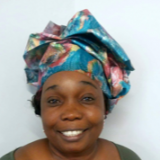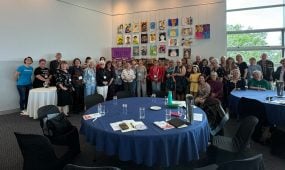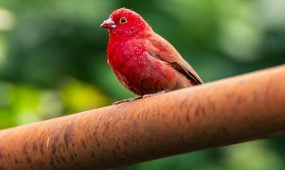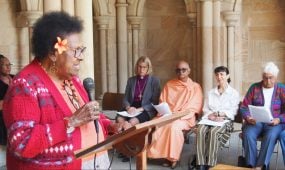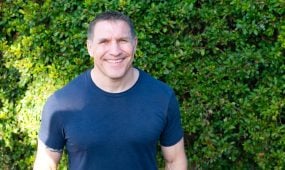“When my mum was pregnant with me she had a dream”
Reflections
“In the following weeks, my mum forgot about her dream. When she gave birth, the midwife asked my mum what she was going to name me. My mum said that she didn’t know and so the midwife replied with, ‘How about you name her ‘Rebecca’ after me?’ That was when my mum remembered her dream,” shares The Rev’d Rebecca
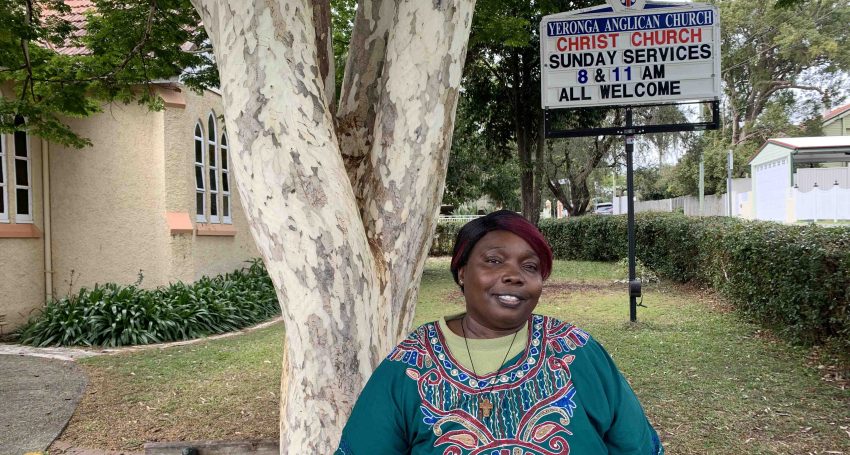
Women are the foundation of the family in Sudanese communities. The sisterhood, aunty-hood and grandmother-hood, along with motherhood, are the foundations of the family. When you educate girls and women, whole communities benefit.
In Arabic, which is a language shared by diverse Sudanese community members, there is a proverb that says something like, “Under the feet of the woman, there is living water that never runs out.”
The strongest memories I have of my mother are during the famine in Sudan between 1983 and1985. The famine was caused by drought. I was living with my family in Khartoum at the time.
One of my most vivid childhood memories of the famine is of my mum, upon waking every morning, taking an axe and cutting down a tree for wood to cook with. She used to dry okra and lamb meat and spent hours every day grinding sorghum for porridge and asda to feed nearly 80 people in the household, including my mum and dad, my 10 siblings and me and 65 guests who lived with us during the famine. Many of these people had fled warzones. My mum also fed war orphans and our neighbours in the local area.
This period was very formative for me because it showed me what church is about.
I am the fifth of 11 children and the second eldest girl. Number 10 sibling was born during the famine when the hospital was too expensive for delivering babies. So my mum gave birth to her without a midwife or doctor present. I was a young teenager at the time. I was home sick one day and didn’t know my mum was pregnant until she gave birth. On the day she went into labour, she prepared everything – the clothing, linen, hot water, salt, razor, everything.
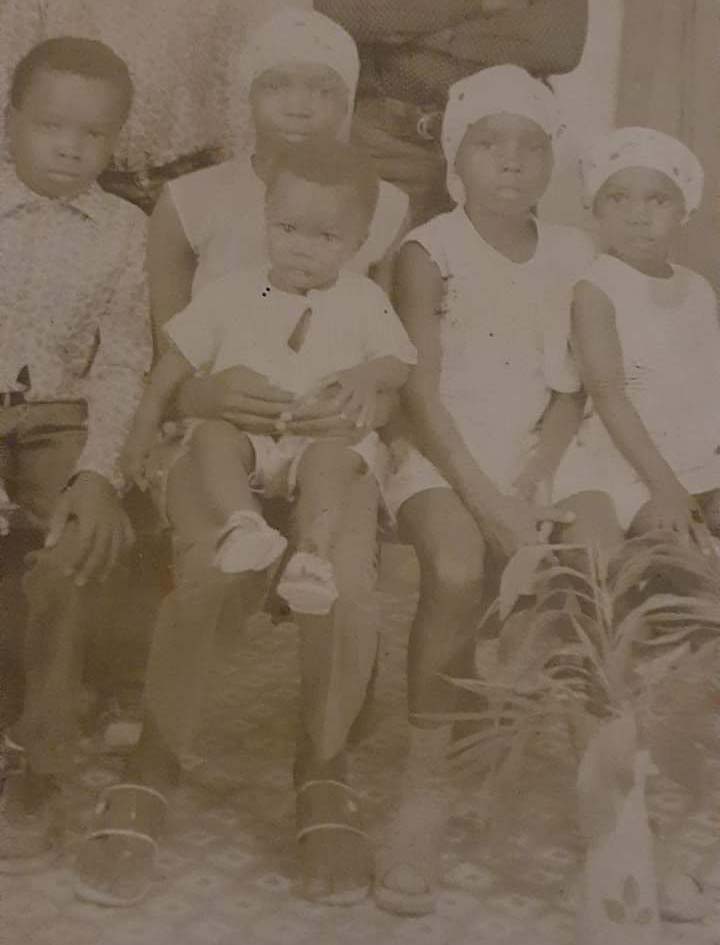
The Rev’d Rebecca King is seated second from right with her mother and some of her siblings: image taken in Khartoum, 1982
She even spent hours creating a long thread from regular cotton wool so she could use it to tie my baby sister’s navel. I watched her rubbing the cotton wool between the palms of her hands, wondering what she was doing.
I eventually realised what was going on when the baby was born.
Because the baby was born in an intact amniotic fluid sac, my mum asked me to cut the sac with the razor. I did so with trembling hands, petrified that I would cut the baby. Once my sister was free, Mum asked me to hold her upright on my shoulder before hitting the baby between the shoulder blades with the heel of her hand to get her breathing. My mum then asked me to cut the umbilical cord with the razor and I tied the baby’s navel with the cotton thread Mum had spun by hand.
Advertisement
It was at this point that I started to sob – I was just so overwhelmed. Soon after I tied the navel, within just 15 minutes of her giving birth, my mum stood up and walked to the neighbour’s and called out for help. The neighbour, Leila, came immediately. Seeing me so upset, she scolded my mum, who said, “Rebecca has to go through this. She has to know what to do – one day she will be a doctor or a missionary.”
When my mum was pregnant with me she had a dream. She had only just found that she was pregnant – by that time I was 25 weeks old. She said that in her dream angels appeared to her and told her that she was going to give birth to a girl and that she should be named “Rebecca”, which in my culture means “to walk gently with others”. She said that she was also told in her dream that her baby would become a “servant of God and carry his word”. When she woke up, my mum told my dad.
Advertisement
Because there is no “Rebecca” in my family, this name was very unusual.
In the following weeks, my mum forgot about her dream. When she gave birth, the midwife asked my mum what she was going to name me. My mum said that she didn’t know and so the midwife replied with, “How about you name her ‘Rebecca’ after me?” That was when my mum remembered her dream.
My mother taught me everything – how to read, preach, sing in Moru (my mother tongue), shop and cook, run a house for 80 people (taking turns with my sisters), manage money, tend to wounds, embroider, crochet and sew.
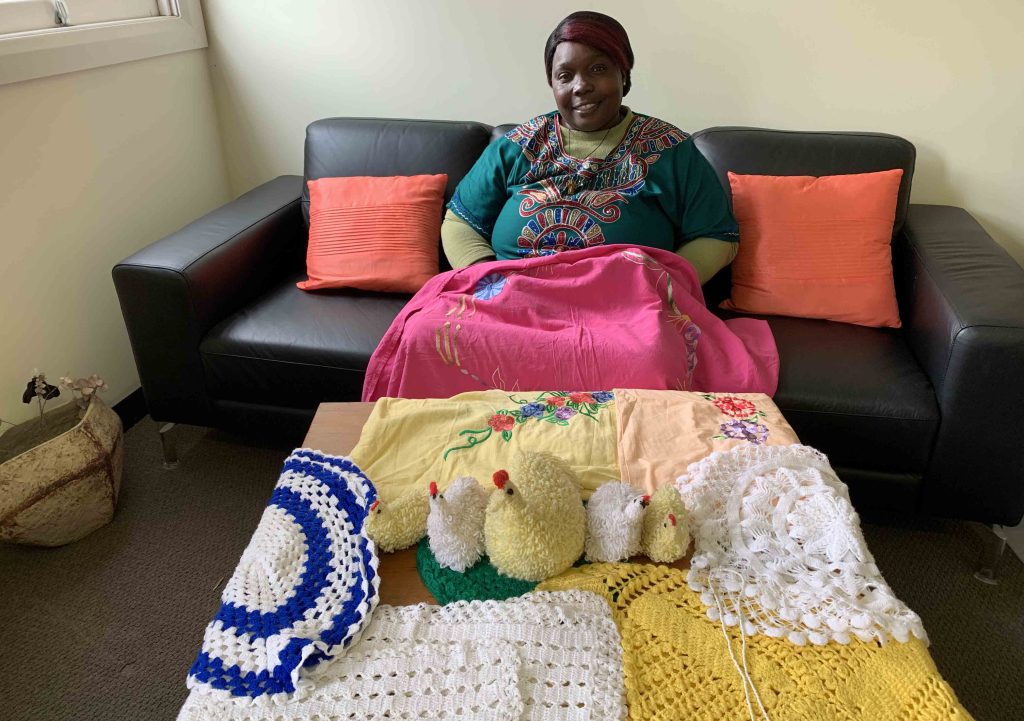
“I completed the blue and white crocheted piece after my mum passed – she started it. The chickens were made by my mum for me because in my culture chickens are important – if you are given a chicken, it is a symbol that you are a special guest and so my mum gave them to me as a reminder to be generous and welcome the stranger. Most of the other items were made my me – my mum taught me how to embroider, knit and crochet.” (The Rev’d Rebecca King, August 2022)
Most important of all, she taught me how to welcome people. Mum used to tell me that if I didn’t have food or tea to give guests, that I must give water. In my culture water is very important. Water is kept in a vessel made of hardened mud in a special place on the grounds, such as under a tree.
A man used to come regularly to visit. We would offer him water. One time when he came he said shukran, which means “thank you” in Arabic. Instead of replying with the customary afwan, which translates to “you’re welcome” in this context, we accidentally said a similar sounding word that means “you stink”. When my father noticed that he had not visited for some time, he spoke to us. My father asked us what we said to him and when we told him, he explained what the word meant. Even though it was an honest mistake, my mother and father insisted we apologise – the man was very relieved when we did so.
Saying sorry and ensuring the man felt welcomed back were especially important for Mum. For my mother, giving water in the hot summer, when temperatures can rise above 50 degree Celsius, is a ministry.
Even though she did not go to school, my mum learnt all the Gospel books by heart. She grew up in a strong Anglican family – her adopted father was the first Archbishop of South Sudan. And, she was the head of the Mothers Union in Khartoum for many decades.
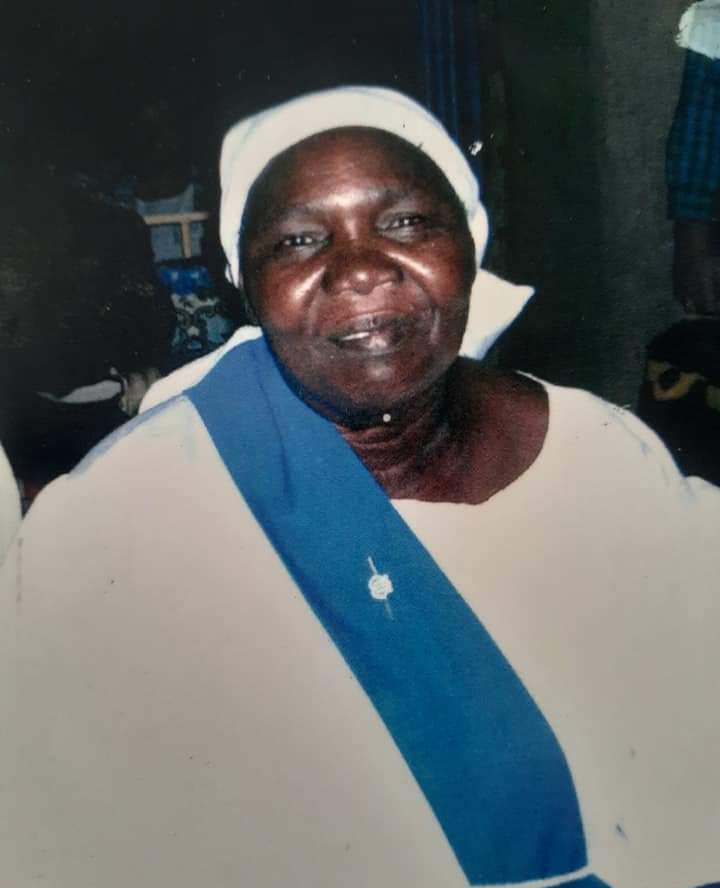
“She grew up in a strong Anglican family – her adopted father was the first Archbishop of South Sudan. And, she was the head of the Mothers Union in Khartoum for many decades.” (The Rev’d Rebecca King’s mother was the head of Mothers Union in Khartoum from the 1970s until she passed away in 2005)
On 28 August, we will remember the seventeenth year of her passing. On the day she passed, I was napping during daylight hours when I felt a “tap” on my shoulder that woke me up. In my heart, I immediately knew that my mum was passing. So I prayed for her. Then I called my family home in Khartoum. Dad answered the phone. I then spoke to Mum, but she could not respond to me – all I could hear was her heavy breathing. I told her that I loved her. She passed within 10 minutes of my call.
She was a very generous, strong, faithful, heroic, caring and intelligent woman, who kept things simple. I think of her and miss her every day.

